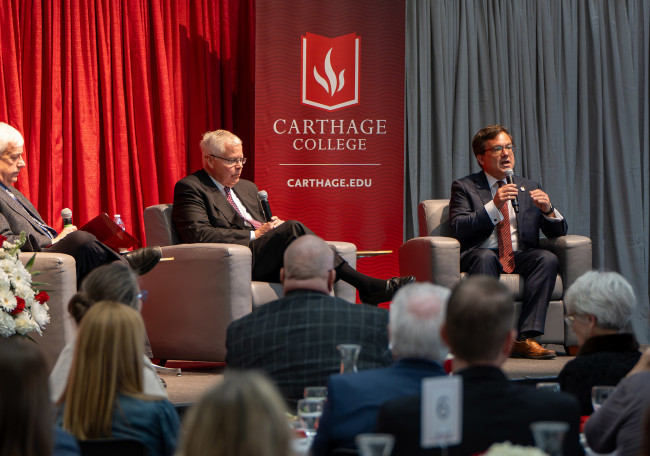
Presidents forecast vital role for colleges in future workforce
Carthage hosted a special program April 18 that provided timely insights into higher education’s role in building the Wisconsin workforce of tomorrow.
The conversation featured two transformative leaders in higher education: Carthage president John Swallow and Universities of Wisconsin president Jay Rothman. Audience members included more than 200 business, education, and civic professionals from across the region.
“The Future of Education” event, hosted by Carthage’s Business and Professional Coalition, took place in the Todd Wehr Center. Greg Berg, a Carthage faculty member and longtime host of “The Morning Show” on public radio station WGTD, served as moderator.

Amid growing public skepticism about the value of higher education, both administrators see a vital role ahead for the state’s colleges and universities in partnership with other stakeholders.
“Today, I hope we’ve sparked the conversation about getting the state on the right track when it comes to education, with an emergent nonpartisan, pro-growth agenda,” President Swallow said. “The state’s economy depends on this. The education sector depends on this. And, if we all come together, we can make that happen.”
He said families see through the false narrative that college degrees are irrelevant. Swallow cited estimates that 60% of jobs paying $50,000 or more already require a four-year degree — a share that rises to 70% for emerging fields.
“Yes, students need to choose wisely about where they go to school and what they do in school, because we want it to pay off for them,” Swallow said. “But we do not want to discourage people who are capable from pursuing a four-year education.”
The presidents agreed removing financial barriers to education is a key factor in broadening the highly qualified labor pool.
“Will education be the great equalizer, or will it expand the gap?” said President Rothman, who arrived in 2022 to oversee a statewide system comprising 13 public universities and an extension network. “Lots of students are one car repair away from dropping out.”
Swallow pointed to affordability initiatives like the 30 percent reduction in tuition “sticker price” Carthage instituted in 2019, as well as the new Carthage Commitment. Open to Wisconsin students with household incomes under $65,000, it assures they won’t pay any out-of-pocket tuition costs beyond the Stafford Loan.
The conversation also touched on ways higher learning has evolved to provide the talent employers need. Swallow noted that Carthage has launched 17 new bachelor’s degree programs in high-demand fields including engineering, data science, and healthcare administration.
Still, both leaders made clear that critical thinking, communication, and other foundational skills — the kind colleges have traditionally cultivated — will maintain their timeless value.
“We have to prepare students for the jobs that don’t yet exist,” President Rothman said. “Those core skills are more critical than ever.”
Taking questions submitted by audience members, they closed the event by praising today’s college students for their inquisitive, caring, and resilient nature.
